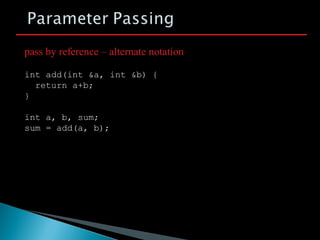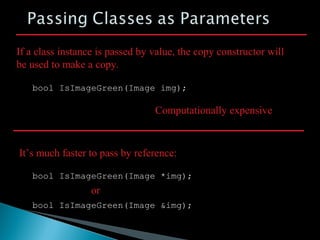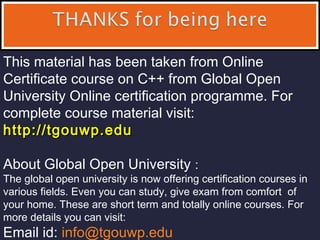Cppt 101102014428-phpapp01
- 1. The Global Open University Nagaland C++ Special guide of tricks in
- 2. Pointers Arrays and strings Parameter passing Class basics Constructors & destructors Class Hierarchy Virtual Functions Coding tips Advanced topics
- 3. int *intPtr; intPtr = new int; *intPtr = 6837; delete intPtr; int otherVal = 5; intPtr = &otherVal; Create a pointer Allocate memory Set value at given address Change intPtr to point to a new location 6837*intPtr 0x0050intPtr 5*intPtr 0x0054intPtr otherVal &otherVal Deallocate memory
- 4. int intArray[10]; intArray[0] = 6837; int *intArray; intArray = new int[10]; intArray[0] = 6837; ... delete[] intArray; Stack allocation Heap allocation
- 5. char myString[20]; strcpy(myString, "Hello World"); myString[0] = 'H'; myString[1] = 'i'; myString[2] = '0'; printf("%s", myString); A string in C++ is an array of characters Strings are terminated with the NULL or '0' character output: Hi
- 6. int add(int a, int b) { return a+b; } int a, b, sum; sum = add(a, b); pass by value int add(int *a, int *b) { return *a + *b; } int a, b, sum; sum = add(&a, &b); pass by reference Make a local copy of a and b Pass pointers that reference a and b. Changes made to a or b will be reflected outside the add routine
- 7. int add(int &a, int &b) { return a+b; } int a, b, sum; sum = add(a, b); pass by reference – alternate notation
- 8. #ifndef _IMAGE_H_ #define _IMAGE_H_ #include <assert.h> #include "vectors.h“ class Image { public: ... private: ... }; #endif Include a library file Include a local file Prevents multiple references Variables and functions accessible from anywhere Variables and functions accessible only from within this class’s functions
- 9. Image myImage; myImage.SetAllPixels(ClearColor); Image *imagePtr; imagePtr = new Image(); imagePtr->SetAllPixels(ClearColor); ... delete imagePtr; Stack allocation Heap allocation
- 10. image.h Header file: Class definition & function prototypes .C file: Full function definitions Main code: Function references image.C main.C void SetAllPixels(const Vec3f &color); void Image::SetAllPixels(const Vec3f &color) { for (int i = 0; i < width*height; i++) data[i] = color; } myImage.SetAllPixels(clearColor);
- 11. class Image { public: Image(void) { width = height = 0; data = NULL; } ~Image(void) { if (data != NULL) delete[] data; } int width; int height; Vec3f *data; }; Constructor: Called whenever a new instance is created Destructor: Called whenever an instance is deleted
- 12. Image(int w, int h) { width = w; height = h; data = new Vec3f[w*h]; } Constructors can also take parameters Image myImage = Image(10, 10); Image *imagePtr; imagePtr = new Image(10, 10); Using this constructor with stack or heap allocation: stack allocation heap allocation
- 13. Image(Image *img) { width = img->width; height = img->height; data = new Vec3f[width*height]; for (int i=0; i<width*height; i++) data[i] = img->data[i]; } Image(Image *img) { width = img->width; height = img->height; data = img->data; } A default copy constructor is created automatically, but it is often not what you want:
- 14. bool IsImageGreen(Image img); If a class instance is passed by value, the copy constructor will be used to make a copy. Computationally expensive bool IsImageGreen(Image *img); It’s much faster to pass by reference: bool IsImageGreen(Image &img); or
- 15. class Object3D { Vec3f color; }; class Sphere : public Object3D { float radius; }; class Cone : public Object3D { float base; float height; }; Child classes inherit parent attributes Object3D Sphere Cone
- 16. Sphere::Sphere() : Object3D() { radius = 1.0; } Child classes can call parent functions Child classes can override parent functions class Object3D { virtual void setDefaults(void) { color = RED; } }; class Sphere : public Object3D { void setDefaults(void) { color = BLUE; radius = 1.0 } }; Call the parent constructor SuperclassSubclass
- 17. class Object3D { virtual void intersect(Ray *r, Hit *h); }; class Sphere : public Object3D { virtual void intersect(Ray *r, Hit *h); }; myObject->intersect(ray, hit); If a superclass has virtual functions, the correct subclass version will automatically be selected Sphere *mySphere = new Sphere(); Object3D *myObject = mySphere; A superclass pointer can reference a subclass object Actually calls Sphere::intersect SuperclassSubclass
- 18. class Object3D { virtual void intersect(Ray *r, Hit *h) = 0; }; A pure virtual function has a prototype, but no definition. Used when a default implementation does not make sense. A class with a pure virtual function is called a pure virtual class and cannot be instantiated. (However, its subclasses can).
- 19. int main(int argc, char** argv); This is where your code begins execution Number of arguments Array of strings argv[0] is the program name argv[1] through argv[argc-1] are command-line input
- 20. #define PI 3.14159265 #define MAX_ARRAY_SIZE 20 Use the #define compiler directive for constants printf("value: %d, %fn", myInt, myFloat); cout << "value:" << myInt << ", " << myFloat << endl; Use the printf or cout functions for output and debugging assert(denominator != 0); quotient = numerator/denominator; Use the assert function to test “always true” conditions
- 21. delete myObject; myObject = NULL; After you delete an object, also set its value to NULL (This is not done for you automatically) This will make it easier to debug memory allocation errors assert(myObject != NULL); myObject->setColor(RED);
- 22. int intArray[10]; intArray[10] = 6837; Image *img; img->SetAllPixels(ClearColor); Typical causes: Access outside of array bounds Attempt to access a NULL or previously deleted pointer These errors are often very difficult to catch and can cause erratic, unpredictable behavior.
- 23. void setToRed(Vec3f v) { v = RED; } Since v is passed by value, it will not get updated outside of The set function The fix: void setToRed(Vec3f &v) { v = RED; } void setToRed(Vec3f *v) { *v = RED; } or
- 24. Sphere* getRedSphere() { Sphere s = Sphere(1.0); s.setColor(RED); return &s; } C++ automatically deallocates stack memory when the function exits, so the returned pointer is invalid. The fix: Sphere* getRedSphere() { Sphere *s = new Sphere(1.0); s->setColor(RED); return s; } It will then be your responsibility to delete the Sphere object later.
- 25. Lots of advanced topics, but few will be required for this course • friend or protected class members • inline functions • const or static functions and variables • compiler directives • operator overloading Vec3f& operator+(Vec3f &a, Vec3f &b);
- 26. This material has been taken from Online Certificate course on C++ from Global Open University Online certification programme. For complete course material visit: http://tgouwp.eduhttp://tgouwp.edu About Global Open University : The global open university is now offering certification courses in various fields. Even you can study, give exam from comfort of your home. These are short term and totally online courses. For more details you can visit: Email id: [email protected]
Editor's Notes
- #3: Advanced topics: friends, protected, inline functions, const, static, virtual inheritance, pure virtual function (e.g. Intersect(ray, hit) = 0), class hierarchy.
- #5: C++ arrays are zero-indexed.
- #9: Note that “private:” is the default
- #10: Stack allocation: Constructor and destructor called automatically when the function is entered and exited. Heap allocation: Constructor and destructor must be called explicitly.
- #14: Warning: if you do not create a default (void parameter) or copy constructor explicitly, they are created for you.




![int intArray[10];
intArray[0] = 6837;
int *intArray;
intArray = new int[10];
intArray[0] = 6837;
...
delete[] intArray;
Stack allocation
Heap allocation](https://image.slidesharecdn.com/cppt-101102014428-phpapp01-141220115843-conversion-gate01/85/Cppt-101102014428-phpapp01-4-320.jpg)
![char myString[20];
strcpy(myString, "Hello World");
myString[0] = 'H';
myString[1] = 'i';
myString[2] = '0';
printf("%s", myString);
A string in C++ is an array of characters
Strings are terminated with the NULL or '0' character
output: Hi](https://image.slidesharecdn.com/cppt-101102014428-phpapp01-141220115843-conversion-gate01/85/Cppt-101102014428-phpapp01-5-320.jpg)




![image.h Header file: Class definition & function prototypes
.C file: Full function definitions
Main code: Function references
image.C
main.C
void SetAllPixels(const Vec3f &color);
void Image::SetAllPixels(const Vec3f &color) {
for (int i = 0; i < width*height; i++)
data[i] = color;
}
myImage.SetAllPixels(clearColor);](https://image.slidesharecdn.com/cppt-101102014428-phpapp01-141220115843-conversion-gate01/85/Cppt-101102014428-phpapp01-10-320.jpg)
![class Image {
public:
Image(void) {
width = height = 0;
data = NULL;
}
~Image(void) {
if (data != NULL)
delete[] data;
}
int width;
int height;
Vec3f *data;
};
Constructor:
Called whenever a
new
instance is created
Destructor:
Called whenever
an
instance is deleted](https://image.slidesharecdn.com/cppt-101102014428-phpapp01-141220115843-conversion-gate01/85/Cppt-101102014428-phpapp01-11-320.jpg)
![Image(int w, int h) {
width = w;
height = h;
data = new Vec3f[w*h];
}
Constructors can also take parameters
Image myImage = Image(10, 10);
Image *imagePtr;
imagePtr = new Image(10, 10);
Using this constructor with stack or heap allocation:
stack allocation
heap allocation](https://image.slidesharecdn.com/cppt-101102014428-phpapp01-141220115843-conversion-gate01/85/Cppt-101102014428-phpapp01-12-320.jpg)
![Image(Image *img) {
width = img->width;
height = img->height;
data = new Vec3f[width*height];
for (int i=0; i<width*height; i++)
data[i] = img->data[i];
}
Image(Image *img) {
width = img->width;
height = img->height;
data = img->data;
}
A default copy constructor is created automatically,
but it is often not what you want:](https://image.slidesharecdn.com/cppt-101102014428-phpapp01-141220115843-conversion-gate01/85/Cppt-101102014428-phpapp01-13-320.jpg)





![int main(int argc, char** argv);
This is where your code begins execution
Number of
arguments
Array of
strings
argv[0] is the program name
argv[1] through argv[argc-1] are command-line input](https://image.slidesharecdn.com/cppt-101102014428-phpapp01-141220115843-conversion-gate01/85/Cppt-101102014428-phpapp01-19-320.jpg)


![int intArray[10];
intArray[10] = 6837;
Image *img;
img->SetAllPixels(ClearColor);
Typical causes:
Access outside of
array bounds
Attempt to access
a NULL or previously
deleted pointer
These errors are often very difficult to catch and
can cause erratic, unpredictable behavior.](https://image.slidesharecdn.com/cppt-101102014428-phpapp01-141220115843-conversion-gate01/85/Cppt-101102014428-phpapp01-22-320.jpg)



